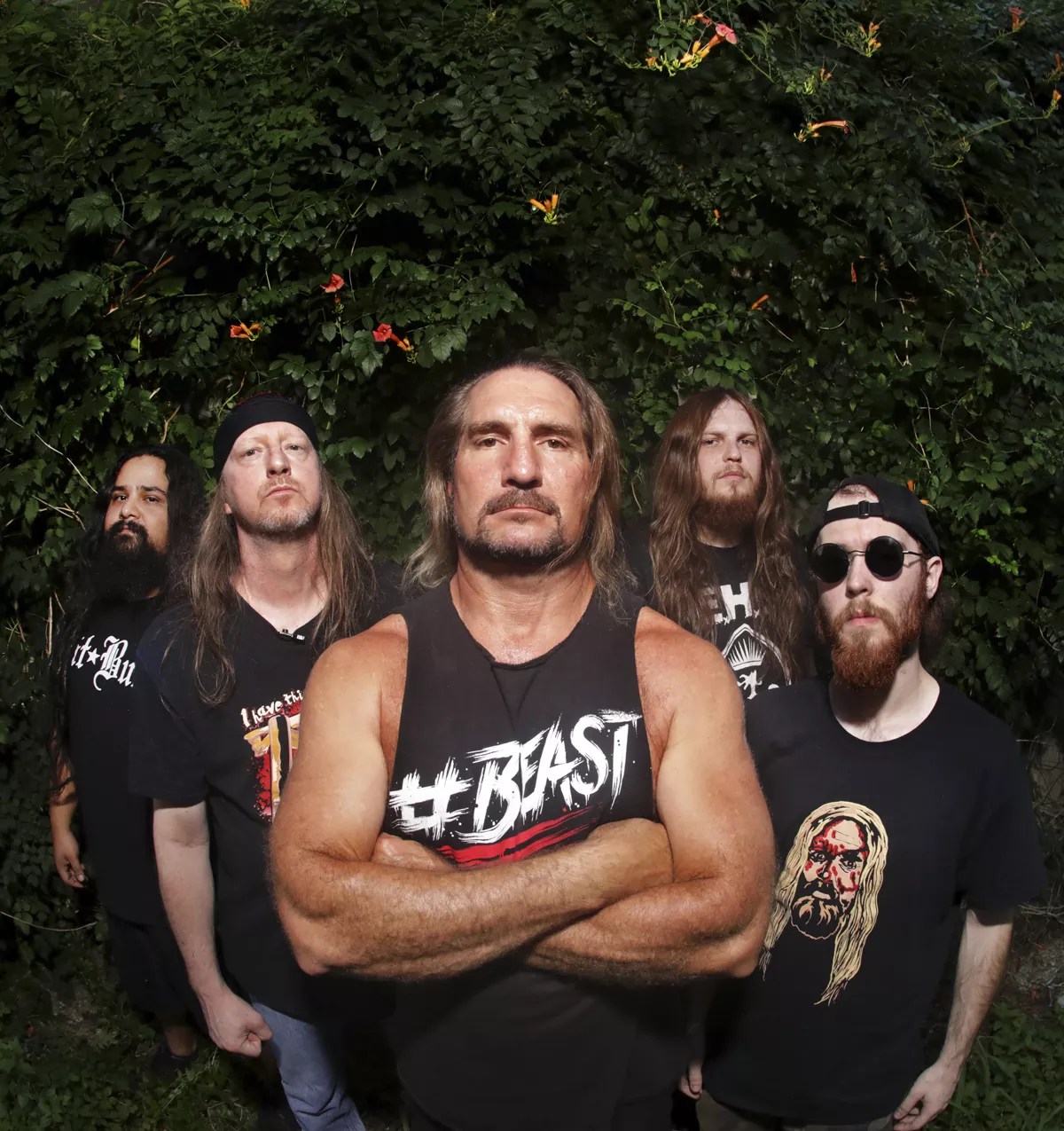
Jason Janik

Audio By Carbonatix
Bruce Corbitt doesn’t move as he once did onstage. It’s usually gloriously brutal when he unleashes what he calls his “machine gun type of barking vocals” that often leave the crowd gasping for air by the end of the show. But Friday night at The Rail Club in Fort Worth, he could only muster enough strength to sing a couple of verses from the powerhouse thrash song “Punishment For Gluttony.”
“I’ve only got enough energy to get one more verse out of me,” he told the crowd when he took the stage, holding his signature chain-link microphone. “But I’ve got to do it.”
Corbitt was recently diagnosed with stage 3 esophageal cancer.
“After much discussion with the doctors and specialist, they’ve told me there’s no chance within any reasonable time that I’ll ever be able to perform again,” he announced in a Facebook live video in May. “So it breaks my heart at this time that I’m forced to announce my retirement from singing. I’m sorry to all of my bandmates for letting them down. I’m devastated with all of this hitting me so fast. I’m still in shock.”
With a black Warbeast do-rag covering his head, his long hair now brittle and thin, Corbitt, 54, still seemed to be in a state of shock, though in high spirits, as he stood next to his Warbeast family onstage July 14. He had spent the last several weeks undergoing chemotherapy and radiation treatments to shrink the pecan-shaped tumor at the base of his esophagus. He had traded in his hospital gown for his black heavy metal attire but spent most of the time hanging near side stage during his band’s performance.
The last time Corbitt appeared on this stage in late May, many believed it would be his final appearance. He’d been released from the hospital to sing one final song but warned that too much strain could cause the tumor to bleed. He later posted on Facebook that the love he felt from his “metal family” had given him the strength to turn one song into three.
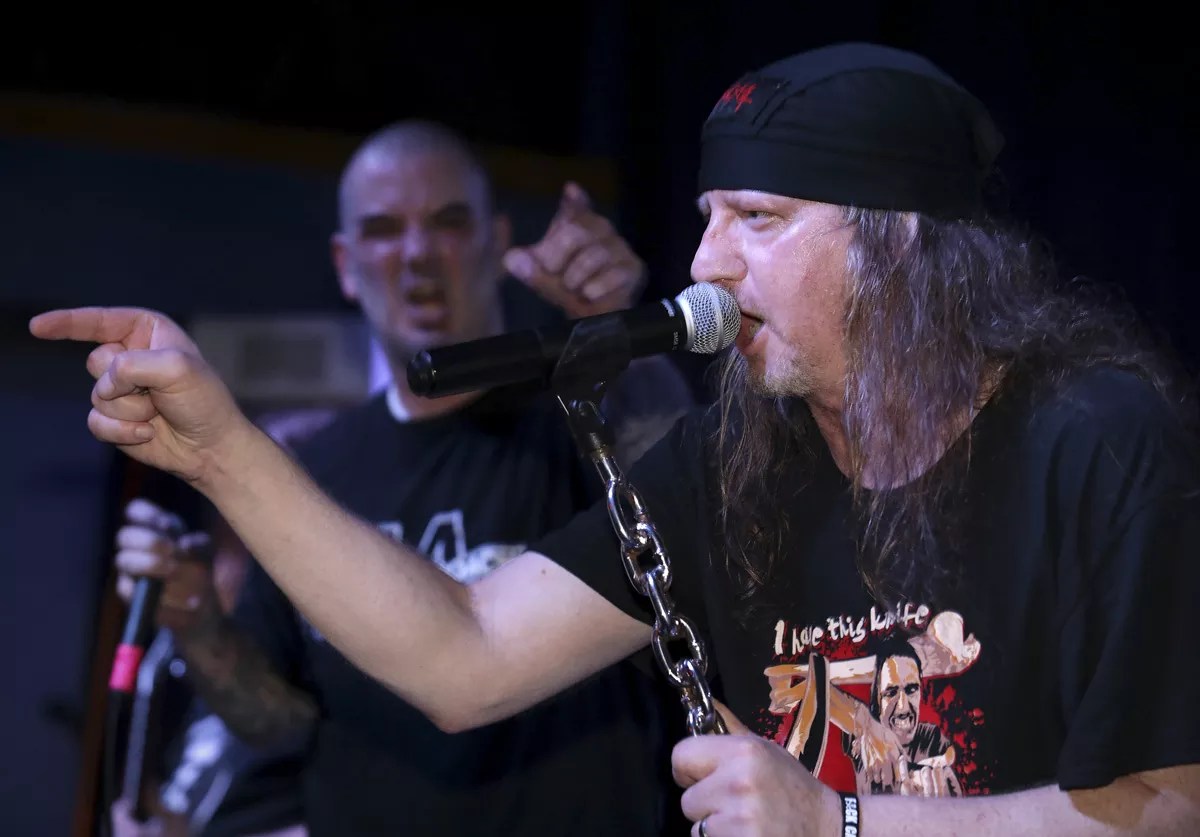
Bruce Corbitt is able to sing a couple of verses with encouragement from ex-Pantera frontman Philip Anselmo.
Jason Janik
Warbeast’s final album release show Friday night at The Rail Club quickly became what fans and friends have called a “fuck cancer” benefit show, with all proceeds going to Corbitt. Local metal bands Rabid Flesh Eaters, Creeper, Life of Scars and Kill For Mother warmed up the crowd, which grew steadily as the sun began to set. Jason Taylor, lead vocalist of Kill For Mother, seemed to capture the other bands’ sentiments when he pointed out that Corbitt had influenced him to follow the dream onstage.
When Warbeast played, former Hammer Witch bassist and vocalist Wayne Abney took over some of the vocal duties. He’s known Corbitt since the ’80s, and he reminded the crowd that Corbitt had hosted a benefit show for him when he wrecked his motorcycle in a near-fatal collision. That show led to Warbeast’s formation.
Abney wasn’t alone. Ex-Pantera frontman Philip Anselmo, a Grammy-nominated metal vocalist, flew in from his Nodferatu’s Lair studio outside of New Orleans to stand in for Corbitt, too. Dressed in similar black metal attire, Anselmo, 49, spent his time between songs rallying the crowd in a healing chant for Corbitt and reminiscing as if the end of an era had arrived.
“He is the staple of the fuckin’ DFW thrash sound,” Anselmo told the crowd before opening with “Nightmares in the Sky” from Warbeast’s 2013 studio album Destroy. “Trust me, I grew up with him.”
Goodbye to an era
Thrash metal pioneers across the country are reaching their 50s and 60s and facing health problems. For some, the damage is self inflicted, the result of a life spent on the road, abusing the bottle, the pipe or the needle. Corbitt says he smoked for 17 years and quit in 2014. In addition to the esophageal tumor, diagnosed in May, he has been struggling with heart disease, discovered in March. He was told esophageal cancer isn’t curable but is treatable if caught early. But his wasn’t.
Some music writers point out that a retro cycle of thrash metal is experiencing a resurgence among younger bands. But local thrash metal pioneer Rick Perry compares the generational divide to the Delta bluesmen from the early 20th century.
“It’s not like we’re the only ones who can play thrash metal,” says Perry, 54. “There are lot of white guys playing the blues, but it’s not the same thing as being a black guy from the Mississippi Delta in the 1920s.”
Corbitt has been around the local metal scene since the early ’80s when bands like Warlock, Boss Tweed and Pantera were playing in pastures. Few bar owners appreciated their music then. He got his start as vocalist for Rigor Mortis, a thrash metal band that many of his peers, fans and critics called one of the most influential to come out of North Texas. He formed Warbeast in 2006 with Perry and Scott Shelby, both of whom played guitar in local thrash metal legend Gammacide.
In a time when many thrash metal pioneers were disappearing from the metal scene, Warbeast released three studio albums — Krush The Enemy (2010), Destroy (2013) and Enter the Arena (2017) — and a split EP, War of the Gargantuas. They also garnered more than 46,000 social media followers. Fans of the albums compared Warbeast’s music to thrash metal legends Exodus, Sacred Reich and Vio-lence, and music critics raved about the band’s ability to channel the old thrash metal sound while still offering something fresh.
It takes a rare breed, Corbitt says, to survive for decades starving on the road, sleeping in vans and earning only enough money to fuel the ride to the next show.
“Thrash was my true passion in life,” he says. “It was always an adrenaline rush like no other and the most difficult and challenging because of the speed, precision and machine gun type of barking vocals with not much room for air.”
More than 35 years have passed since thrash metal first appeared on the local metal scene, and the Warbeast fan base, like other old-school metal bands, now includes grandparents, parents and children, all of whom attended the band’s final show Friday night. But Corbitt and Warbeast aren’t simply saying goodbye to fans; they’re saying goodbye to an era that many claimed ended in the ’90s.

Warbeast guitarist Scott Shelby is flanked by vocalist Bruce Corbitt, drummer Joey Gonzalez, guitarist Drew Shoup and bassist Lyric Ferchaud.
Jason Janik
Growing metal scene
Corbitt met Perry and Shelby in the local underground metal scene in the early ’80s. Only a handful of local bands like Rigor Mortis, Rotting Corpse, Talon and Warlock were attempting what Perry calls a more traditional style of heavy metal at the time. Pantera was harnessing a “party rock/Van Halen type of thing,” he says, until the guys discovered thrash metal titan Metallica and picked up singer Philip Anselmo a few years later.
What started as an underground metal scene eventually caused the rest of America “to lose its goddamn mind” for a brief period in the ’80s and ’90s, as Vice News pointed out in a July 3, 2015, article titled “Revisiting America’s Satanic Panic When Heavy Metal and the Devil Himself Stalked the Earth.” Parents burned heavy metal records. Some kicked their teenagers out of their homes because of long hair and ripped clothing. Preachers discussed the spiritual dangers of listening to heavy metal music.
Thrash metal band Slayer was sued for lyrics that prosecutors claimed had “influenced murder” after members of the metal band Hatred killed 15-year-old Elyse Pahler in a sacrifice to the devil in the early ’90s. A judge later dismissed the lawsuit, according to 2001 reports by Rolling Stone and Metal Hammer magazines.
“There’s not a legal position that could be taken that would make Slayer responsible for the girls’ death,” the judge was reported as saying. “Where do you draw the line? You might as well start looking through the library at every book on the shelf.”
Shelby calls it “the golden age of thrash.”
Many members of local metal bands were old high school buddies and outcasts among their peers at various high schools around the Dallas-Fort Worth area. Some aspiring metal stars, like Hammer Witch’s Abney and Pantera’s Anselmo, moved from places like New Orleans to explore a local metal scene that was quickly growing as West Coast thrash metal band Metallica began to climb the Billboard charts.
They’d go to each other’s shows to check out the metal and stage production. At the time, then-glam metal band Pantera dominated the stage with its arena-type light show and sound quality, forcing the rest of the local bands to up their stage production, Perry says.
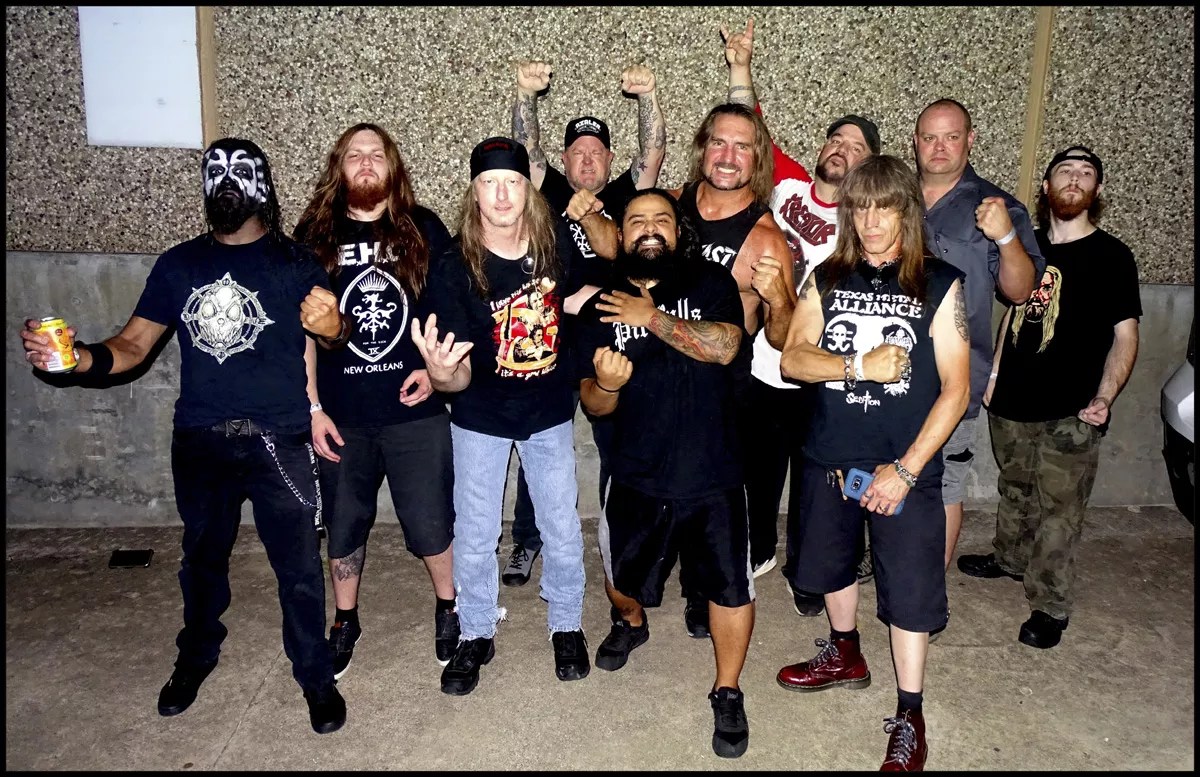
Past and present members of Warbeast gather for the band’s final performance. From left to right, Bobby Tillotson, Drew Shoup, Bruce Corbitt, Casey Orr, Scott “Shelbeast” Shelby, Joey “Blue” Gonzalez, Andre Karst, (crew member) Larry Holmes, Alan Bovee, and Lyric Ferchaud.
Mina Dicterow/Metal Mina Pics
Corbitt had been hanging out with thrash metal band Rigor Mortis since Christmas of ’85. He’d give the members rides, load their equipment and pass out flyers for the band’s upcoming shows.
“I felt it was the next level of heavy metal,” he says. “It wasn’t just the intensity and speed of the music. It was the fact that it was about the music and not dressing up like a rock star. I just knew it was where I felt at home.”
He’d known guitarist Mike Scaccia since they were teenagers in Irving, jamming together in Spectrum, a band that played mostly Black Sabbath covers. Scaccia eventually left the band and formed Rigor Mortis in ’83 with bassist Casey Orr and drummer Harden Harrison. Corbitt made it no secret that he wanted to sing for the band that would later be known as “the Texas Chain Saw Massacre of metal.”
“It was driving me crazy for a while there as I watched them jam,” he says. “I just wanted to be up there with this band.”
Corbitt competed for the lead vocalist spot after Orr made it known that he couldn’t sing and play bass. Six months passed before the Rigor Mortis guys showed up on Corbitt’s doorstep and told him he had landed the gig. He’d just about given up. “It was a rush that is hard to describe and a rush I would feel for the next few years,” he says.
Unlike other local bands that mostly played cover songs at the time, Rigor Mortis and Pantera unleashed original songs that showcased the difference between glam metal and thrash metal. Pantera’s first album, 1983’s Metal Magic, is full of Kiss-inspired sex songs like “Ride My Rocket” and “Tell Me If You Want It.” The group even dropped in a few sex moans in “I’ll Be Alright.” Rigor Mortis followed in Black Sabbath’s footsteps and focused on the grittiness of life in the ’80s, unleashing songs like “Welcome to Your Funeral,” “Bodily Dismemberment,” “Condemned to Hell” and “Wizard of Gore.”
Some rivalries also developed among the local metal bands, mostly fueled by egos and stolen girlfriends. “The Rigor Mortis guys just hated Pantera for whatever reason,” Corbitt recalls. “The Pantera guys just thought Rigor Mortis sucked. Neither band liked the other band’s style. The fans got in on it, too.”
At first, many local bar owners were afraid to take chances on the children of the hippies who had discarded their parents’ flowers, bell bottoms and sandals for skulls, ripped jeans and Chucks. But as more fans showed up to watch local metal bands playing original songs, bars like Joe’s Garage, Saavy’s and the Tombstone Factory were more than willing to accommodate hell on stage in exchange for increased cash flow. It wasn’t unusual, Perry says, to find 300 or 400 people wearing local metal band T-shirts filling the clubs to watch Rigor Mortis, Hammer Witch or Gammacide on a Tuesday or Wednesday night.
“Metal was in its infancy,” Perry recalls, “and we were all learning as we went along. Now the North Texas metal scene is considered legendary.”
This legendary status was fueled, in part, when Rigor Mortis landed a deal with Capitol Records in 1987, followed by Pantera’s 1990 release of Cowboys from Hell to critical acclaim and international recognition. The band went on to earn four Grammy nominations for best metal performance for “I’m Broken” in 1995, “Suicide Note Pt. 1” in 1997, “Cemetery Gates” in 1998 and “Revolution Is My Name” in 2001.
But Corbitt wouldn’t find the same level of success with Rigor Mortis. He had a falling out with the band’s co-founder, Orr, and his bandmates ultimately fired him in 1989, a year after they released their self-titled debut album. Orr didn’t respond to a request for comment, but he told Noisey in September 2014 that part of the problem involved “some stupid, petty shit.” Orr had threatened, “It was either him or me.”
“So we moved on without him,” he said. “In hindsight, I’ll be the first to admit that that was probably a bad decision.”
Rigor Mortis disbanded in the early ’90s. Orr claimed that its members weren’t good businessmen who never had good management or a good label to support them after Capitol Records dropped the band. They were also spending their money at the bar instead of paying taxes or putting it aside for merchandise. “We were total underdogs,” he said. “We were punk rock in the metal world.”
Second chance
Corbitt says he thought he would never appear onstage again. The other guys in Rigor Mortis had successfully joined other established bands. Orr hooked up with Gwar, for example, and Scaccia, the guitarist, blazed a new path with Uncle Al Jourgensen, unleashing some crunching riffs and blazing speed on Ministry’s fifth and sixth studio albums, Psalm 69 and Filth Pig, in the ’90s.
But Corbitt says the ’90s weren’t especially friendly to thrash metal vocalists who channeled heavy metal legends like Iron Maiden’s Bruce Dickinson for vocal inspiration. Metal was beginning to change, and alternative and grunge rock had swept the country. Even Metallica moved away from its thrash metal roots with the release of the Black album in 1991, and Pantera became known for “groove metal.” A few of the local thrash metal pioneers tried to keep the dream alive, but they called it quits by the end of the decade.
“Part of the reason I never did anything after Rigor Mortis was simply because I was never able to get with another band as good as Rigor Mortis,” Corbitt says. “It is hard to go from driving a Ferrari to a Volkswagen. So my heart was just never into it like it was with Rigor Mortis.”
Nearly 15 years passed before Corbitt found another Ferrari.
Over the years, most of the premier local thrash metal bands had fallen apart or embraced other styles of heavy metal like death metal, groove metal and prog metal. Rotting Corpse headed to the grave in ’90, followed by Rigor Mortis in ’91, Gammacide in ’92 and Hammer Witch in ’94. What little hope millions of fans had for Pantera to reunite after disbanding in 2003 evaporated when a deranged fan shot and killed guitarist “Dimebag” Darrell Abbott onstage a year later.
A year after Abbott’s death, Corbitt was invited to join his former Rigor Mortis bandmates for a reunion tour. “We knew that we made a lot of mistakes back in the ’80s,” Corbitt told the Observer in April 2012. “We didn’t like the way it ended, and we patched up our differences. We decided to try again, and hopefully we have learned from our mistakes.”
After it played the San Antonio leg of its 2005 reunion tour, the band stayed at the home of Corbitt’s older brother. Corbitt was especially close to his brother Jeff, who had suggested to their mother that they name Corbitt after Batman’s not-so-secret identity, Bruce Wayne. But a recent separation from his wife of 20 years had left Corbitt’s brother in a bad place. The band noticed it, Corbitt says, because his brother was taking too many pills to deal with it.
Corbitt says his older brother was proud to see him reunited with his band and watched them drive off into the sunset to continue their short tour. It was the last time Corbitt saw him alive.
“I knew I was the one person that could help him, maybe the only one,” he says. “But I made the decision to wait until after the tour before I started talking to him about it — a decision I will regret for the rest of my life.”
The decision haunted Corbitt because his brother had asked him to move to Austin and work with him on his sound and lighting business, but Corbitt couldn’t because he planned to do the Rigor Mortis reunion tour. The day after Corbitt returned home from the tour, his brother killed himself.
“I still believe my bro might still be alive if Rigor Mortis wouldn’t have done a reunion tour,” Corbitt says.
As Corbitt dealt with his brother’s death, his old thrash metal buddy Abney, who fronted Hammer Witch in the ’80s, wrecked his motorcycle in a near-fatal accident in August 2006. Corbitt wanted to do a benefit show for Abney and called Perry to see if Gammacide might be able to get together. Instead, Perry suggested that they ask thrash metal pioneers from the scene, like Shelby, if they wanted to team up and jam some of their greatest hits. Shelby suggested calling the supergroup Texas Metal Alliance.
Rotting Corpse bassist Steve Murphy, Rigor Mortis bassist Orr, Hammer Witch guitarist Darrin Kobetich and drummer Sal Torneo, and Gammacide bassist Alan Bovee joined Shelby, Perry and Corbitt onstage at Dreamworld Music Complex in Arlington to help raise money for Abney. “I think that the main thing it did was raise Wayne’s spirits because all his brothers had gotten together for him,” Perry says.
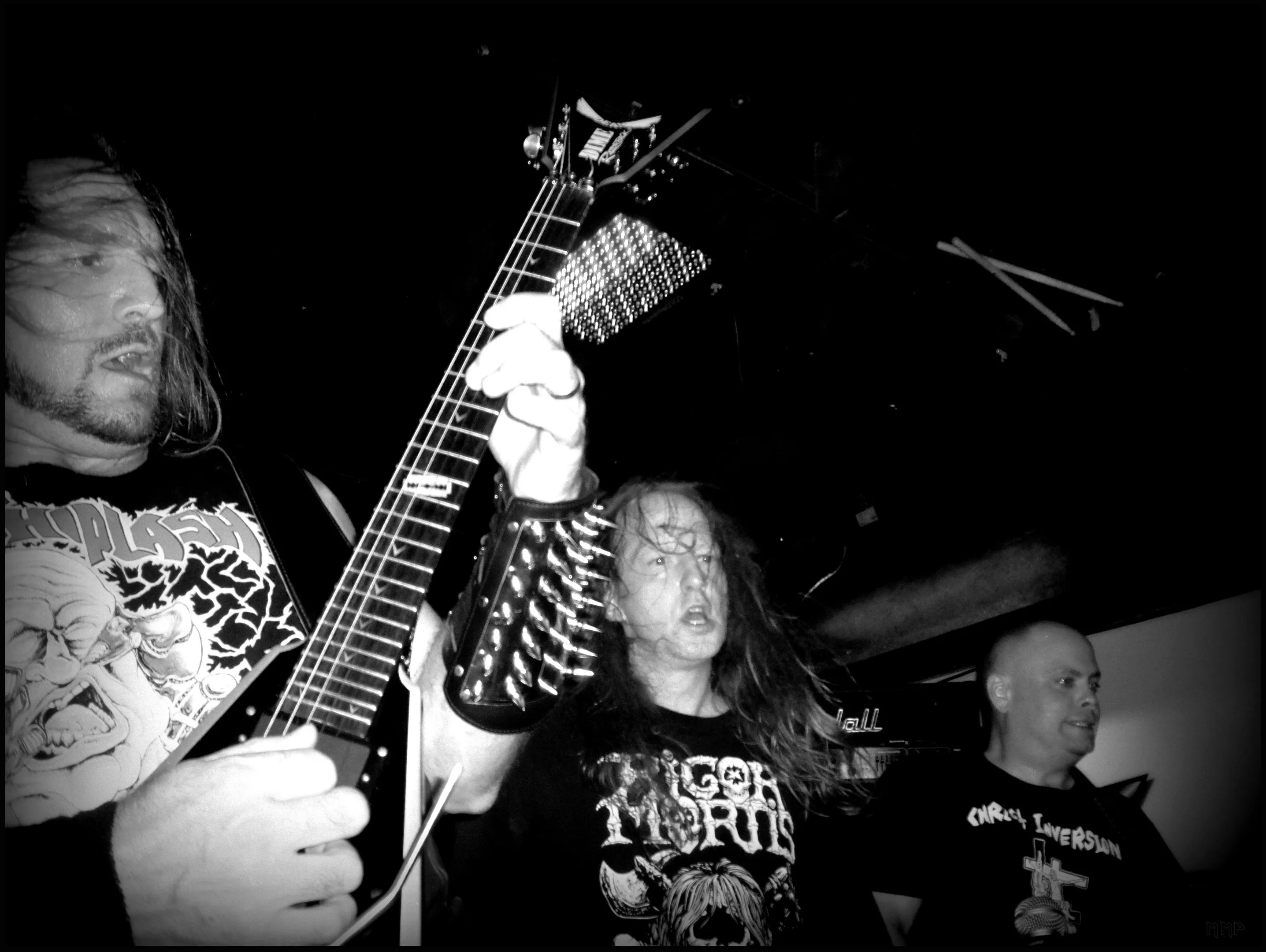
Scott Shelby, Bruce Corbitt and Alan Bovee performing in April 2010.
Mina Dicterow/Metal Mina Pics
It also gave Perry, Shelby and Corbitt such a rush, Perry says, that they didn’t want to stop. They wanted to keep jamming together, but like most bands, they needed a drummer. They found Joey Gonzalez, who was 17 at the time, at a club jamming onstage with the local death metal band Demonseed.
“I knew he was the one, and I didn’t care who I pissed off to get him,” Shelby says. “I like to be a showman when I play, and Joey was putting on a show. He would head bang and stand up and play the drums. He seemed fresh, and the others didn’t.”
Shelby and Perry had written most of their new band’s first album, Krush The Enemy, and Shelby had built a jam room for the band in a warehouse in Arlington. They decided to change the band’s name because they thought Texas Metal Alliance sounded too much like a project, and they wanted to have a real band’s name. “I basically wanted to have a name that if you saw it, you would have no fucking doubt what kind of music they play,” Perry says.
They chose Warbeast.
“So finally I had something I felt was as good as Rigor Mortis,” Corbitt says. “I had some badass, mother-fucking musicians to back me up. That’s when I am at my best … not just the frontman part but everything I do to help the band, promoting and etc.”
Corbitt’s drive to help his new band led him to reach out to Anselmo, who was running his own record label, Housecore Records. Corbitt says he didn’t send their demo to Anselmo because of the record label but because they were friends who had reconnected on the road. Anselmo called him a week later and praised him, the band and the demo. He wanted to sign them to a record deal.
“Somehow I had this second chance,” Corbitt says. “Now I can finally say that I have done something good besides Rigor Mortis. So the redemption feeling I got wasn’t about proving anything to anyone else. It was about proving it to myself.
“I always felt like I lost my brother because I started singing again,” he adds. “So the only way I could deal with it was to prove there had to be a reason that it happened this way. There had to be more to it than just a 2 1/2-week Rigor Mortis reunion tour. So what getting signed with Warbeast really meant to me was that I finally had some closure on my bro’s death.”
The band’s lineup has changed over the years. Perry left the band not long after Krush The Enemy was released in 2010, followed by bassist Bovee in 2012. Ex-Sweet Tooth guitarist Bobby Tillotson joined in 2010 and stayed until 2014. Ex-Infernal Aggression bassist Andre Karst came on board in 2012 but left a year later. Ex-Rigor Mortis bassist Orr joined in 2013 and remained until 2014. The current lineup includes Drew Shoup on guitar and Corbitt’s stepson Lyric Ferchaud on bass. All the former members came together for Corbitt’s benefit show.
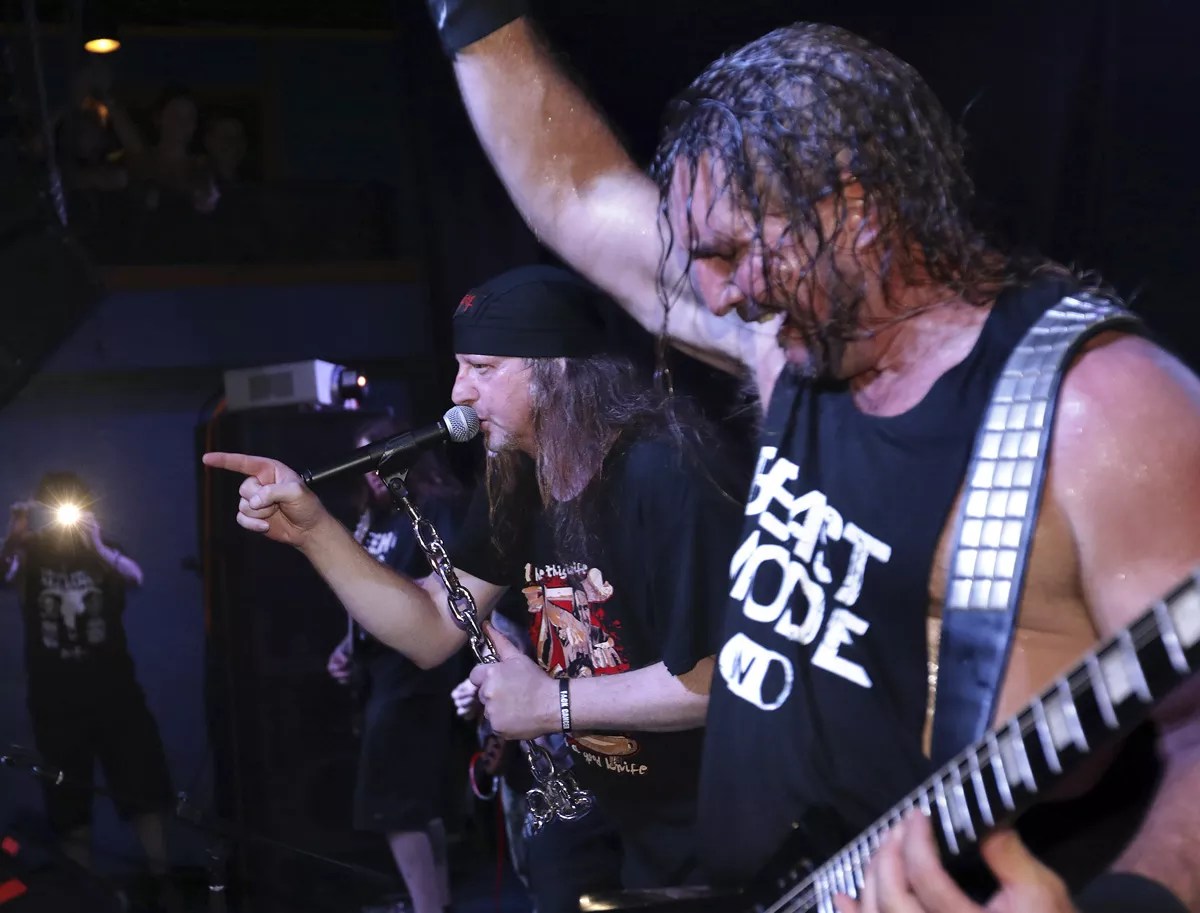
The dynamic duo play their final song together.
Jason Janik
‘One day we will reunite’
At Corbitt’s “fuck cancer” benefit show Friday night, the crowd seemed to help him find closure to this chapter of his life. But Corbitt and others hope he’ll be returning to the stage. It’s a promise Corbitt seemed to make when he gave his loved ones a Facebook update about his condition before the show.
“I’m happy I’m down to one radiation treatment,” he wrote. “I’m proud of how I’ve held up so far. I’m thrilled I haven’t lost all my hair yet like they said I would. I’ve shedded a lot … but still have enough to look like me at our final show. I’m going to beat this cancer, damn it … because I’m Bruce Fucking Corbitt … aka ‘Batman.’ You know damn well!”
Corbitt appeared onstage twice Friday to sing a couple of verses of “Punishment For Gluttony” as Anselmo and The Rail Club crowd cheered him on and Shelby and the Warbeast crew provided support.
The benefit show turned into hell onstage by the end of the night. A fire-breathing Shelby, who at 52 still resembles a giant barbarian, ignited the end of his guitar and banished a metal head who was dressed like Jesus Christ, wearing a long, white robe and red sash over his shoulder, from the stage.
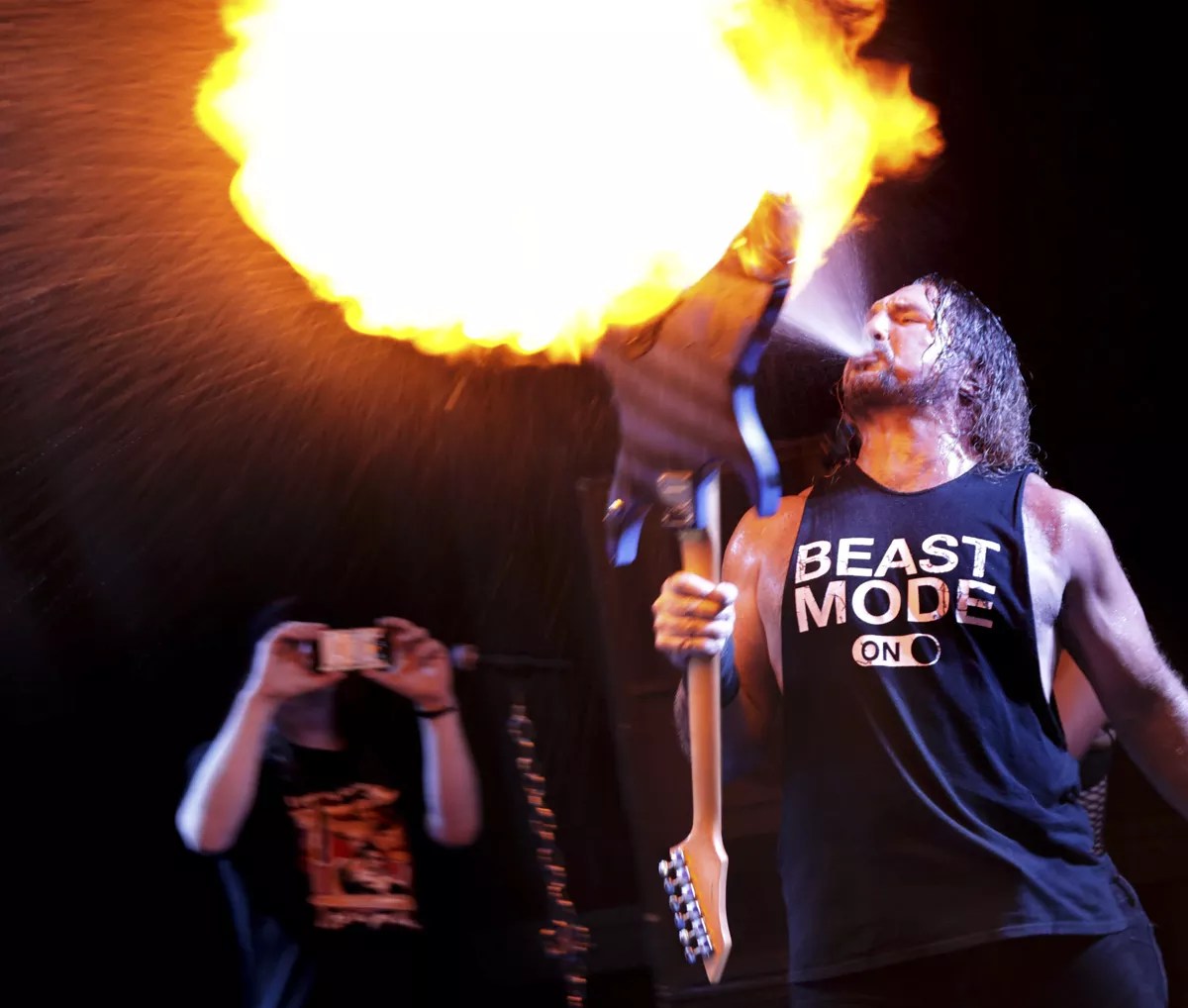
Scott Shelby ignites his guitar in more ways than one.
Jason Janik
The hitchhiker from Texas Chain Saw Massacre, Ed Neal, also appeared onstage with Corbitt and Michael “Scratch” Huebner of 12 Pound Productions to premiere Warbeast’s new music video, a short film for the song “Hitchhiker.” Neal later slayed the crowd with his rendition of the song while Corbitt stood next to him and provided directorial support.
As the band of five took its final bow, Anselmo slipped on his backpack behind them and exited stage right because the night wasn’t his opportunity to bask in the spotlight one final time. A day before the show, he sent the Observer a message to discuss why the event was a monumental occasion for the Texas metal scene, a message he reiterated for fans onstage:
“This is bitter-sour but still sweet because it was requested by one of my closest and best big brothers ever, Bruce Corbitt, that I fill in for him on this final Warbeast show. And I shall. But I’m no Bruce. I will do the best I can, but honestly, Bruce’s voice is a staple of the DFW thrash sound. People have grown up with it for 20-plus years, if not 30! His voice is embedded in their ears and his image in their minds, whether it’s with Rigor Mortis or Warbeast. It hurts that this is Warbeast’s last show, and it hurts that Bruce is going through hell and I’m not sure he can even attend. But it’ll all be for him. Me filling in is what it is, and I’m honored beyond words. It will be absolutely wonderful to be onstage with my brethren of Texas thrash, but damn it, I’m torn up inside on this one. Forget records. Forget business. This gig’s for Bruce and the awesome DFW fans of all musical tastes within the genres of heavy metal.
“Bruce, I know you’ll read this, so I just wanted it in print — I love ya, brother. I hope I can come halfway close to doing you proud. In retirement, know this — you made a dent in this crazy biz, and yes, your contribution to the long line of great metal vocalists is as valid as it comes. Rest up, heal up and come back swinging. We need ya, man.”
Both Abney and Anselmo attempted to sing new and old Warbeast songs but, as Anselmo pointed out, there is only one Corbitt.
“So I’m watching my band play its final show from the side of the stage, and a million things are running through my mind,” Corbitt told the Observer on Sunday. “Less than two short months earlier, we thought this night would be the launching pad for a bunch of shows and tours to promote our new album. But instead, our metal family had rallied somehow to turn a bad situation into an unbelievable gathering of emotion, respect and support. I’ve never felt the amount of love displaying inside The Rail Club that night at any show I’ve ever attended. DFW’s metal family is truly unmatchable when it comes to our support for each other in both good times and bad times.”
At the end of the night, all five members of Warbeast appeared onstage together. But one of the most moving moments occurred when Corbitt said farewell to Shelby.
“I’ve never had a chemistry like I’ve had with you,” he said. “When we get onstage, something just happens, man. We’ve got something together. It’s something special. We are the fucking dynamic duo, the fucking Joey Perry and Steven Tyler of thrash metal. And one day we will reunite.”
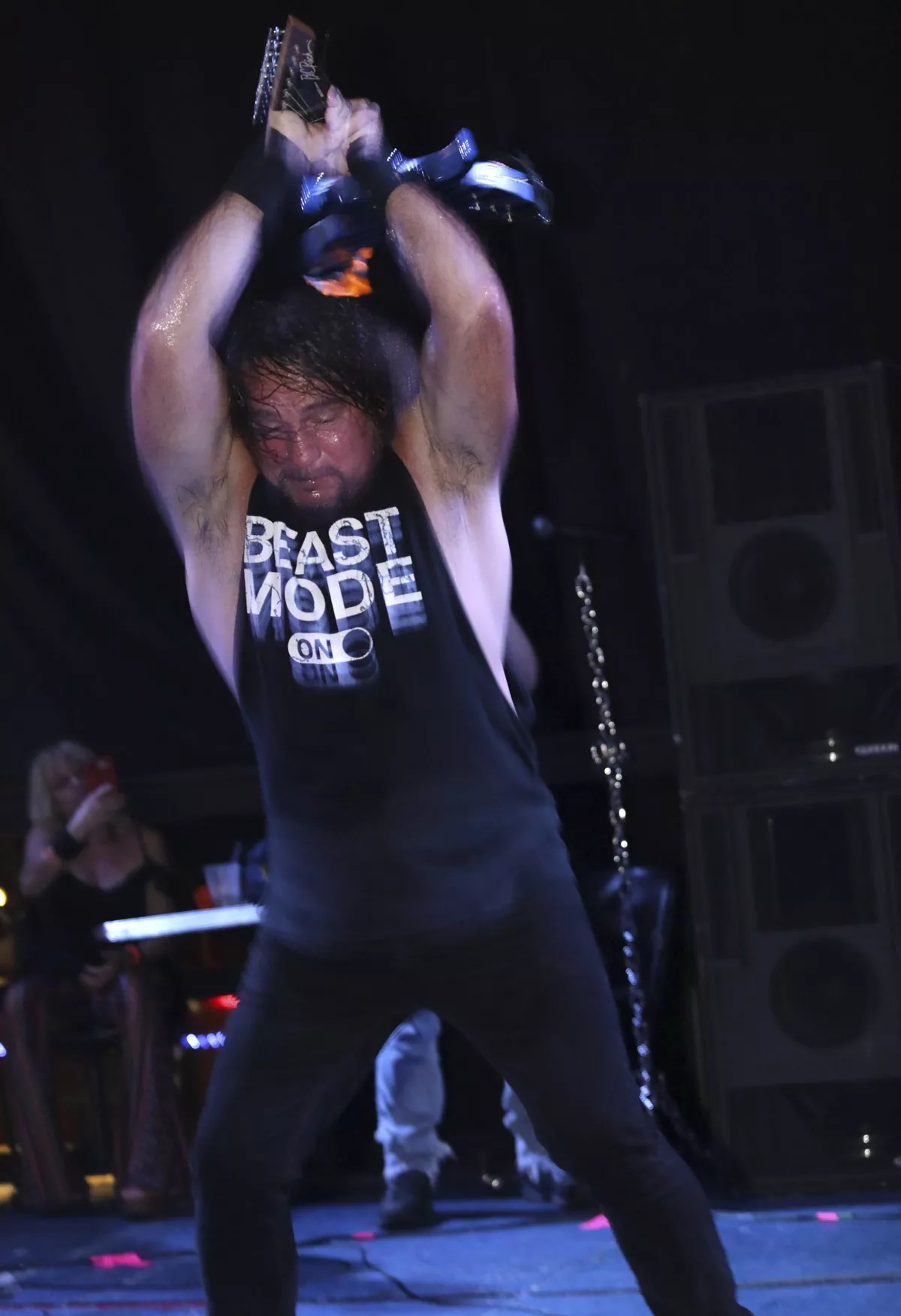
Scott Shelby saying goodbye with a guitar thrash.
Jason Janik